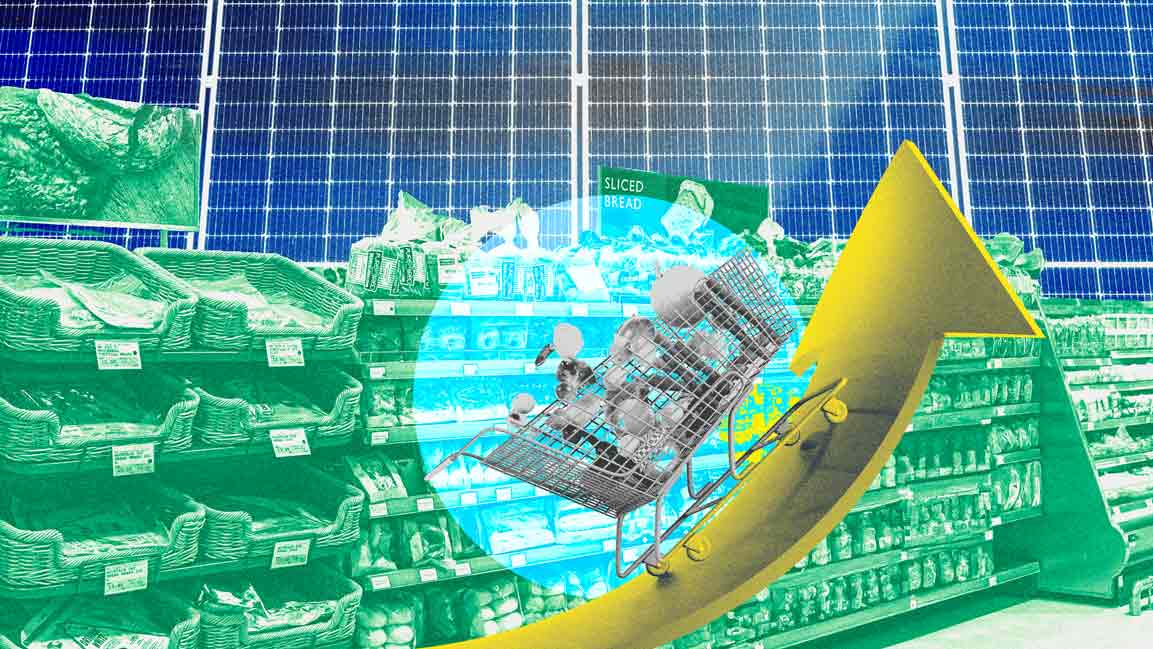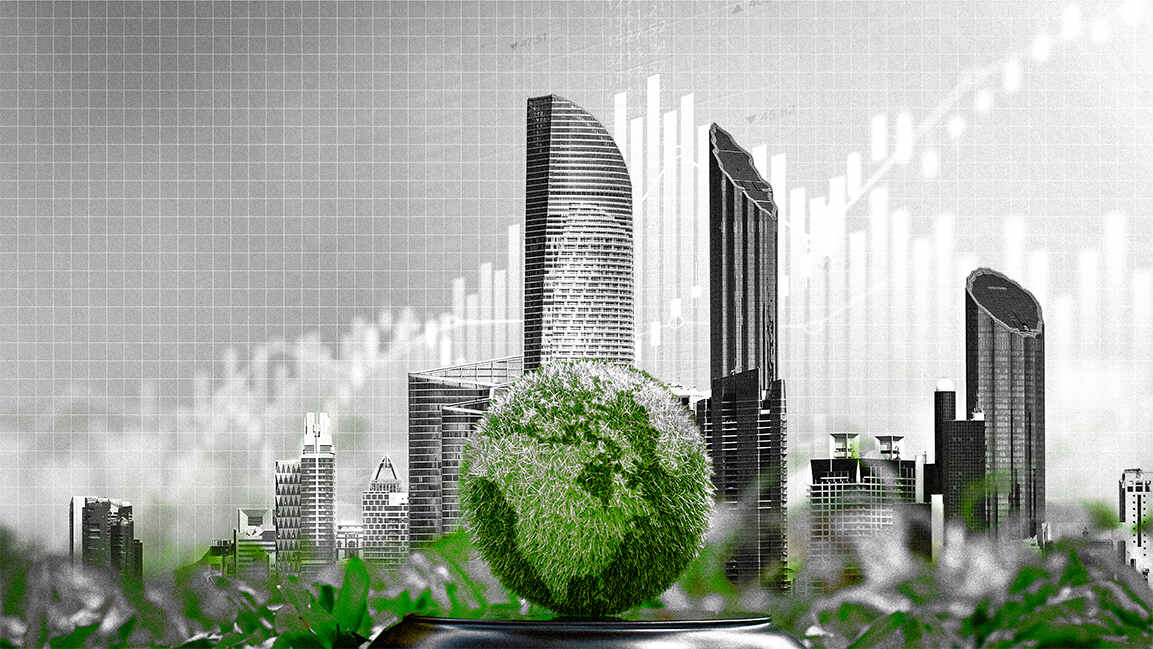- | 9:00 am
These business leaders explain how the climate crisis is impacting sustainability
Business leaders across industries discuss what can make businesses sustainable and how climate change can be addressed.

Bold acceleration of sustainability initiatives by governments across Middle and North Africa has encouraged businesses to prioritize it, honing long-term ideas to address some of the most pressing issues, including climate change.
But more needs to be done. Recently, speaking at the International Association for Energy Economics Conference in Riyadh, Princess Noura Turki Al-Saud, a founding partner of AEON Strategy, urged greater participation from businesses to scale up sustainable projects.
Earlier, companies’ concerns about climate change have typically been focused on their operational, financial, and reputational risks, the latter associated with the growing importance of the issue among young people. Now, climate change is calling into question the traditional sustainability paradigm and how companies address their impacts on society and the planet.
We ask the leaders what can make businesses sustainable in the long run and how they should address climate change. Here’s what they said:
Dr. Ray O. Johnson, CEO of Technology Innovation Institute
“Technology will be a great enabler of achieving our sustainability goals as we tackle the threat of climate change. Research and development will be at the heart of transitioning businesses and society to a greener future, from enhancing the efficiency of current energy sources to discovering new forms of power. Middle Eastern countries have invested extensively in climate tech, such as the UAE’s Rain Enhancement Program to address water security. The Technology Innovation Institute is working on numerous research projects across renewable energy, water security, biotechnology, and more to help advance and commercialize innovative solutions that will positively impact future generations.”
Abdulnasser Bin Kalban, Chief Executive Officer of Emirates Global Aluminium
“Aluminium’s use plays an essential role in improving transport efficiencies, reducing energy consumption and global greenhouse gas emissions, improving product longevity, and reducing demand on natural resources. Hence, we recognize that making products that help meet social and environmental challenges is not enough. It also matters how responsibly those products are made. For long-term sustainability goals, environmental performance, social performance, and responsible governance are all important.”
Dr. Azad Moopen, Founder, Chairman & Managing Director of Aster DM Healthcare
“Working collectively with other organizations will help us to make planet earth a present for future generations which is our duty and responsibility. It is a connected world – people and organizations must come together, identify opportunities and achieve a common objective on climate policy. Many major companies in the Middle East have set net-zero targets and have implemented numerous initiatives. While implementing some strategies might not have an immediate effect, we must continue to work towards enabling a sustainable future for the planet.”
Florence Bulté, Chief Sustainability Officer of Chalhoub Group
“It starts by building a strong sustainability strategy based on a precise assessment of what is material for the business. What is our industry? Who are our stakeholders? In which region do we operate? In which ecosystem do we evolve? This assessment will lead to priorities for which KPIs can be set, and a roadmap can be developed. Change begins at the top, and leaders must build the right governance to embed sustainability and an environmental focus in their business strategy. To tackle climate change, businesses will have to adopt global practices and adopt a net-zero ambition, establishing a detailed road map with short-medium term targets and consistently measuring and reporting in a very transparent way.”
Reda Raad, CEO of TBWA/RAAD
“Every organization must incorporate transparent and committed sustainable initiatives into its business strategy. The creative industry, in particular, has a big role to play in creating authentic and impactful work that educates and advances causes such as sustainability, social justice, equity, and well-being. Agencies should work with ESG clients, alert brands and businesses on their ecological footprint, and establish a culture of sustainability by pushing for healthier and more sustainable practices – starting with transforming workspaces to be energy efficient, cutting plastic, incentivizing public transportation and bicycle commuting, using renewable energy and packaging.”
Aviva Steinberger, Director of Innovation Diplomacy at Start-Up Nation Central
“Integrating sustainability into long-term business planning is increasingly important for MENA-based companies, driven by the region’s vulnerability to climate change effects. However, a key challenge for many business leaders is identifying solutions and technologies that offer a path to scalable sustainability. One way to address this is by securing high-potential tech partnerships: for R&D to have a scalable impact, there is a need for initial investments in small-scale, targeted proofs of concept.”
Saad Toma, General Manager of IBM MEA
“Sustainability is more than reducing emissions. Businesses need to apply a 360-degree sustainability approach, with goals spanning their entire operations — focusing on areas like asset management, IT infrastructure, supply chains, climate and weather insights, analysis and reporting of ESG data, the broader impact of their business on the community, and more. With AI-driven technologies, companies in the Middle East can more easily collect and analyze the vast amounts of sustainability data scattered across their business and automate feedback between operational endpoints and corporate sustainability initiatives. Technology can help businesses move beyond capturing and reporting data to improve operational performance, turning data into insights that help them make smarter, more sustainable daily decisions.”
Hala Dahmane, President & Managing Director of Azraq
“Businesses in the Middle East should develop a pathway to net zero that follows science-based targets and is in line with international reporting standards. They should introduce nature-based solutions into their strategies, such as mangrove planting and coral restoration. These initiatives seek to protect, sustainably manage, and restore natural ecosystems in the UAE, mitigating the impact of climate change while simultaneously promoting human well-being and biodiversity. Further, promoting sustainability can improve a business’s reputation and build a loyal customer base, contributing to its long-term success.”
Mohannad Zikra, Co-founder and CEO of Stella Stays
“Countries like UAE, KSA, and Egypt are home to some of the fastest-growing companies in the world. The biggest challenge and opportunity for governments and businesses is to build sustainable infrastructure to support economic growth while lowering carbon emissions year-on-year. Hence, technologies need to be injected into every part of a property’s lifecycle to empower data-driven decisions of which residential products to build and how to distribute or utilize them in the most efficient fashions, and reduce waste.”
Kabir Mulchandani, Chairman and Founder of FIVE
“Recognizing the goal congruence of sustainability and long-term financial strength is the key. What do we mean by goal congruence? Well, operationally efficient and smart buildings will reduce environmental impact and improve well-being, saving costs by eliminating waste and inefficiency. Developing robust governance structures and building a social and environmental well-being culture all contribute to an empowered and sustained workforce that drives business longevity. Further, in light of climate change and ultra-competitive luxury markets, consumers are increasingly making sustainability a deciding factor.”
Fiona McBride, CEO of Kaplan Professional ME
“With growing concerns over climate change, depletion of natural resources, and the impact of human activities on the environment, companies must take sustainability seriously. Gone are the days when businesses could only focus on profits. Today, it is all about balancing financial health and sustainability strategy. It is not just about doing the right thing but about being smart and proactive for the future of the business. Empowering the employees through training and creating a culture of awareness and responsibility towards the environment is the need of the hour. If we don’t get on board with sustainability, we will lose both business and staff.”
Ibtissam Ouassif, Co-founder and Chief Product Officer of Cashew Payments
“Businesses in the region must ensure that they are taking proactive steps toward climate change by creating an environment focused on long-term sustainability rather than short-term benefits. Offering incentives for employees who implement sustainable practices into their day-to-day lives can encourage greater participation amongst staff members, ultimately leading towards positive environmental impacts over time when adopted on a mass scale. Collective change in numbers is the only way to tackle a problem of this scale.”
Othman Al Ali, CEO of Emirates Water and Electricity Company
“For businesses, acting sustainably and pursuing decarbonization is not just a matter of choice, but responsibility. By switching to energy-saving solutions, decreasing carbon emissions, and introducing recycling and circular economy programs, businesses across the region can be key enablers of national sustainability and net zero goals. In the UAE, we are witnessing the public and private sectors unite around the shared goal of realizing net zero by 2050 strategic initiative. We support Abu Dhabi organizations in achieving their sustainability goals by assuming a critical role in executing the Clean Energy Certificates scheme.”
Mark Tester, CSO and co-founder of RedSea Farms
“Companies can become more sustainable through awareness, collaboration, and the adoption of new technologies. To be optimally effective, their efforts and solutions should consider both the environmental footprint and commercial viability. It is exciting to see continued collaborations amongst businesses to tackle climate change and a rise in complementary technologies being developed. Specifically in agriculture, we must break the food-water-energy nexus as in MENA, 87% of the region’s water resources are used for agriculture. Investing in technology and fostering competition to diversify food sources will encourage food security.”
John Grainger, COO, Dulsco Environment
“A key way businesses can enhance their green footprint is through the introspective reflection of company practices. Establishing a recycling drive, waste segregation at source, going paperless, adopting energy and water-efficient technologies, and eliminating single-use plastics is an excellent start. Companies should also increase awareness through CSR initiatives to inspire a culture of change at the individual and youth levels through education. Supporting initiatives such as the UAE’s net zero 2050 and circular economy 2031 initiatives will also help achieve the shared goal of sustainability.”
Rob Beswick, Managing Director of Virgin Mobile UAE
Accountability and honesty are the drivers leaders need to consider when making a strategy to make a business environmentally sustainable in the long run. We must be bold and aspire to make our businesses carbon-negative, not just neutral. This means minimizing our carbon impact and giving back to the environment, rethinking the business model completely. Companies should always be honest and hopeful. We do not have all the answers or fully understand all the complexities and potential consequences related to climate change. But the small things we do can impact our world, which is why every step matters.”
*Fast Company Middle East compiled these responses, which have been lightly edited and pared down for length.







































